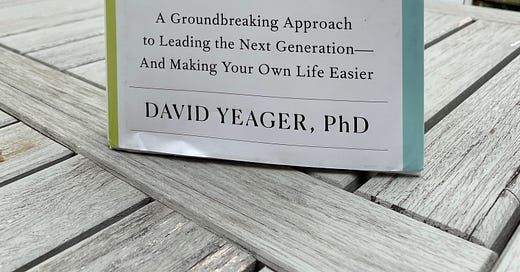Why blaming 'kids these days' doesn't work
A new book of rigorous science on motivating adolescents and helping them flourish
I really liked this book, and think you science of learning folk will, too.
Well here we are, back again! You can get everything The Bell Ringer has to offer if you become a full subscriber—do that here. There are a *lot* of science of learning books coming out this winter, and I’m gearing up to report on them and talk to their authors. Today’s post is the first of a bunch of them, about the book 10 to 25: The Science of Motivating Young People, by psychologist David Yeager. I learned a lot about the science of motivation that I didn’t know. My thoughts below.
Remember grit? How it swept the education establishment in the early 2010s as the silver bullet that was going to solve all classroom problems? Kids needed more grit and perseverance, it all seemed obvious to us then. We had been emphasizing academic rigor too much, stuffing brains with information, and forgetting about character traits that helped students succeed. When Paul Tough’s How Children Succeed was published in 2012, I even held a virtual book club on one of my first blogs about it.
I still have the summary of Tough’s thesis on what was going wrong highlighted in my copy of the book:
Ellington (Tough’s son) would be growing up in a culture saturated with an idea you might call the cognitive hypothesis: the belief, rarely expressed aloud but commonly held nonetheless, that success today depends primarily on cognitive skills—the kind of intelligence that gets measured on IQ tests, including the abilities to recognize letters and words, to calculate, the detect patterns—and that the best way to develop these skills is to practice them as much as possible, beginning as early as possible.
Tough goes on to say that the cognitive hypothesis was, at that time, universally embraced and the water all children were swimming in: smart leads to success. But a new kind of research questioned that hypothesis. Psychologists and cognitive scientists were going through a bit of a revolution, studying what they thought might play a bigger, more important role in academic achievement: character traits.
What matters most in a child’s development, [these experts] say, is not how much information we can stuff into her brain the first few years. What matters, instead, is whether we are able to help her develop a very different set of qualities, a list that includes persistence, self-control, curiosity, conscientiousness, grit and self-confidence. Economists refer to these as noncognitive skills, psychologists call them personality traits, and the rest of us sometimes think of them as character.
Through this bestselling book, which heavily focuses on the research of Angela Duckworth, author of Grit: The Power and Passion of Perseverance, and of Carol Dweck, author of Mindset: How We Can Learn to Fulfill Our Potential, and some others, and the commodification of these non-cognitive skills, the social-emotional learning industry was born. There was an explosion of SEL modules and worksheets and classes (when my youngest was in grade school, one of the rotation specials nestled in between art and music was “SEL” class). The answer to Tough’s big question, can these character traits be taught to kids in a way that is useful?, was an assumed and enthusiastic “Yes!” Schools and districts rushed to the idea, checkbooks in hand. Terms like growth mindset and grit became part of the lexicon of how we talk about helping students succeed at school.
Now here we are in 2024, and, as with so many other silver bullets, the education world has become jaded on grit. Even before some groups—a few of them rather unserious and antagonistic—attacked social-emotional learning as bootcamps for little Marxists and future fragile snowflakes, many in education were skeptical of whether or not all this focused dedication, time and money for trying to teach children how to “have better relationships” or how to “persevere in the face of adversity” made any difference at all. Often classroom efforts seemed unsure exactly how to translate the science into actual tools and skills, and interventions and curricula could often be (IMHO, were more likely to be) unfocused and watered down.
Evidence on these interventions’ efficacy was mixed. The results of two meta analyses of growth mindset interventions from recently, 2022, came up with two different conclusions on whether they actually helped students. Carol Dweck herself doubted the value of school-based interventions, telling TES editor Jon Severs that “Growth mindset is even more complex than we imagined…In the beginning, as I have freely admitted, we did not recognise the complexity of the implementation.”
Here at The Bell Ringer, I’ve been focusing mostly on the research on teaching and learning academic material. It’s what a lot of my reporting focuses on, and because of reporting I began doing on kids with dyslexia and the science of reading, beginning way back in 2015, I think shining a light on the science of academics is not only compelling and interesting, but something the public desperately needs to understand more about.
But a new book by University of Texas at Austin, psychologist David Yeager, has opened my eyes to reconsider and rethink the science of non-cognitive skills—namely because it appears to have gotten more robust.




